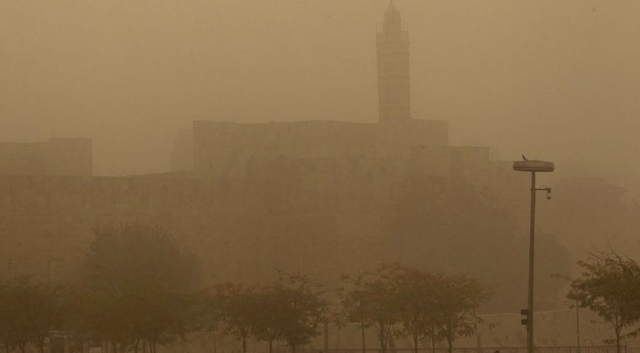“Give ear, O heavens, and I will speak; and may the earth
hear the words of my mouth.” Devarim
(Deuteronomy) 32:1
Erev Yom Kippur. It is now late morning as I sit in my
garden to reflect. There is a waft of sweet guava. A bird sings. A gate creaks.
The roads are sleepy quiet as this day is a holiday in
Israel. No school and no work for most. People take this day to prepare for the
fast, cooking the festive meal before the fast begins, calling friends,
spending time with family and visiting relatives’ graves.
It was 5:45 a.m. this morning when Amir, Talya and I stepped
into the car. The sky was still dark and the air fresh as we drove to the
beach. It was a gentle morning, the waves soft and quiet.
We ran the length of the beach, hugging the shore where the
sand is packed. No earphones today; my feet stepped to the waves slipping rhythmically
to the shore.
We then took out our machzorim to do tashlich, a prayer to
ask for forgiveness. We looked out to the horizon, where sea meets sky and
Talya said a personal prayer to G-d aloud:
I love you. I love your world. I love your
creations. I love it all, the good and the bad, the laughter and the tears. The
sea and the sky, the birds and the trees. When I sit in the cool, clear, fresh
water I remember a promise you made thousands of years ago. You put the sky and
the sea as witnesses to that promise. The sun never fails to rise every single
day to light up the world once more even after we're sure it abandoned us for
good. The waters that crash on the shore are always pulled back into the place
from which they came. They may not resurface in the same shape or size, but
they will always be part of the sea.
We brought some bread to throw into the sea and I felt a
little sheepish doing this on such a public beach, imagining some
environmentalist lecturing me on the havoc wreaked in the marine system because
of these breadcrumbs. Instead, a woman came up to us and asked what we were
doing, standing in the waves with our prayer books.
“Tashlich,” we replied.
“I want to do this too. Can I join you?”
We gave her some bread and this woman soon realized her Hebrew was superior. She took over the reading for us.
We threw our breadcrumbs to sea, as if we were discarding
our sins, casting them into the water, watching them swirl, sink.
“Besorot tovot,” she wished us. Only good things.
As we cast our bread, I looked out and saw a large delegation
of swimmers coming towards us. They soon emerged at our feet. Turns out it was
the local Ra’anana triathlon club. This morning they ran to the beach, swam and
were about to run back.
They gathered on the shore and I saw a man with a kippa, one
of the triathletes, reading from a prayer book. They all listened intently, threw a piece of bread into the sea, embraced, then started to run the 10 kilometers
home.
Here were two occasions of what one could label secular Jews
reaching out to Hashem and touching their souls.
According to Dov Lipman, who recently wrote in the Times of
Israel, “The era of “secular” Israeli Jews is over and recognizing this will help us take the crucial first step
towards the fulfilment of what should be our ultimate goal: an Israel in which
levels of religious observance and piety are between each person and God, and
in which we don’t have a compulsion to identify what type of Jew we are but can
simply be “Jews.”
Living in Israel, I see examples of this every day. We are a
soulful people and we want to connect and be connected, just like the sea and
the sky, the heavens and the earth. We strive to make the two meet.
After tashlich, we swam out and floated on our backs. Our
arms were limp, our legs buoyant. The sun was just peeking over the cliffs,
bathing our faces in light.
“Give ear, O heavens, and I will speak; and may the earth
hear the words of my mouth.” Moshe’s song that we will read in synagogue this
Shabbat addresses the eternal heaven and earth.
We may be small floating specks, but in moments when we let
go, allowing the waves to take the lead, giving in, breathing deeply, melting
into nature’s rhythm, we become connected and an intrinsic part of the harmony
of creation.
Wishes for a G'mar chatima tova and a meaningful fast.










